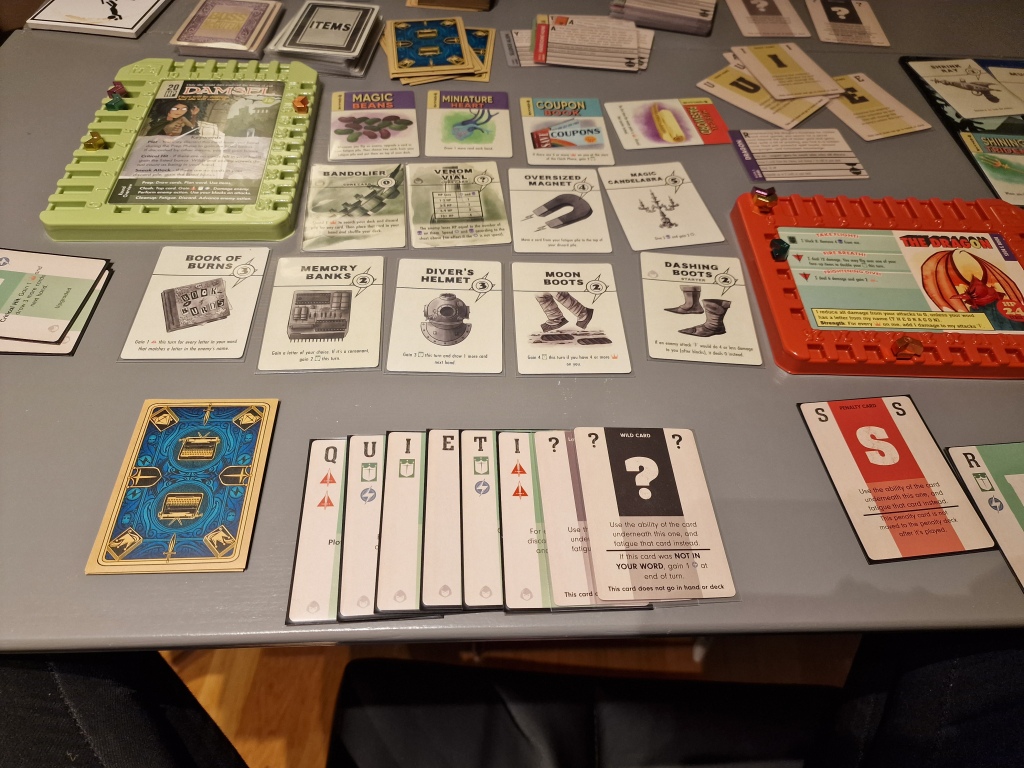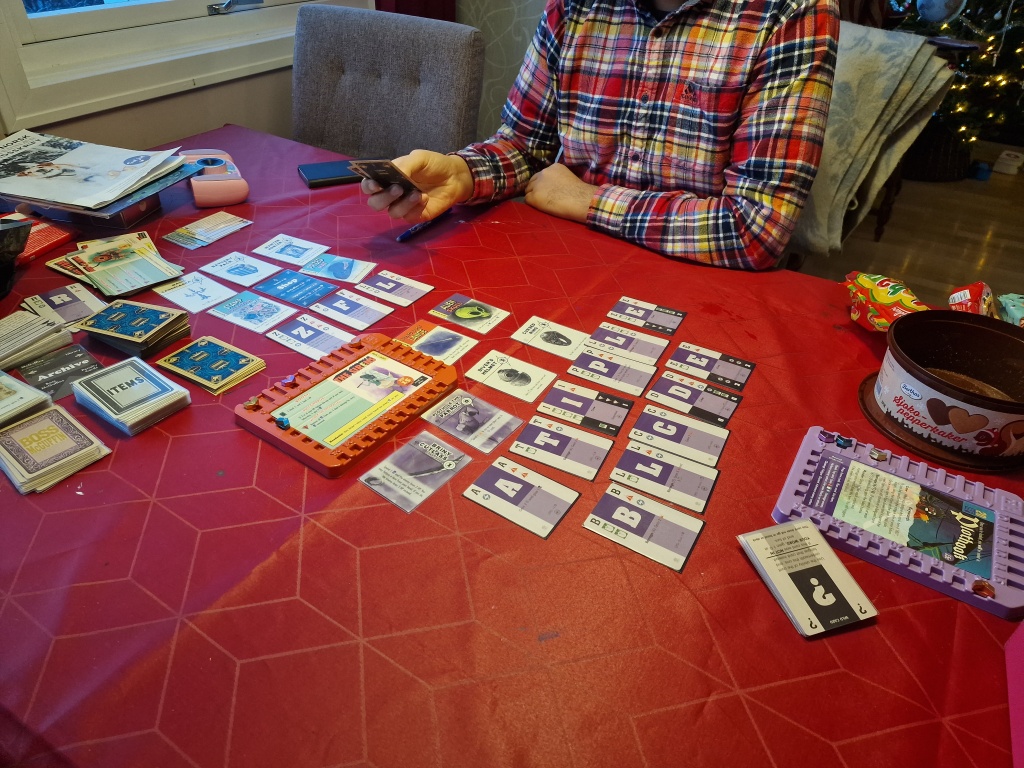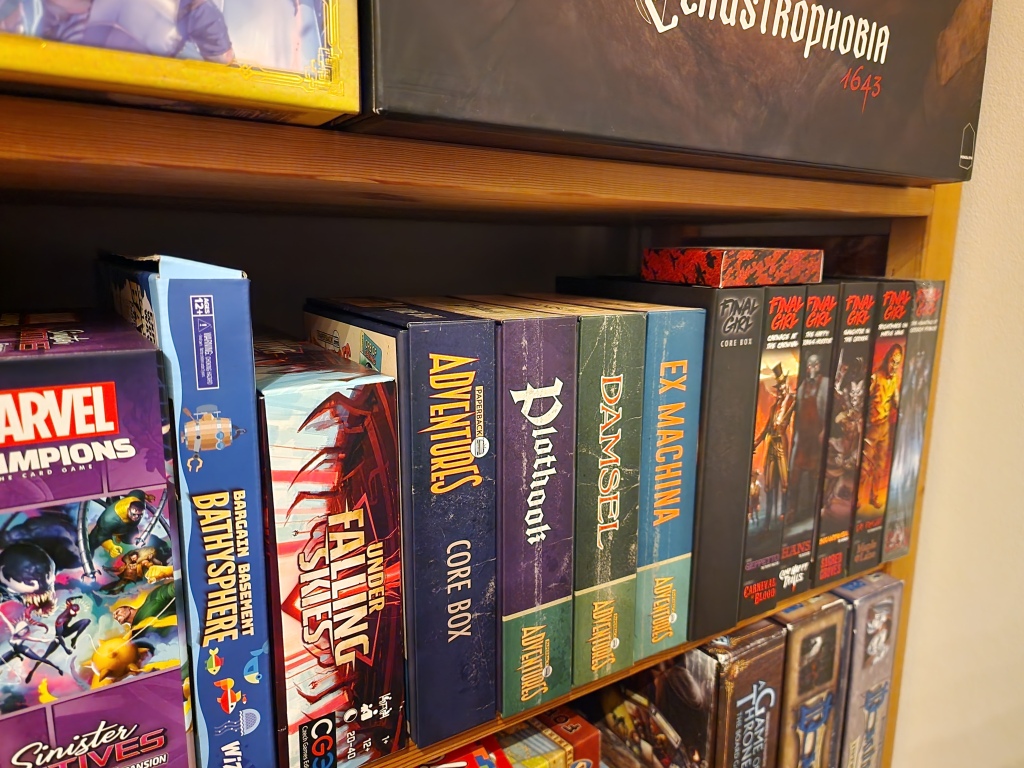
I love word games. I love looking at an unpleasant jumble of letters and the exhilarating feeling of relief I get when I manage to sort them into sweet, sweet order and meaning. I also hate word games. I loathe the embarrassing feeling of hopelessness as I get trounced because the only thing I manage is to add S’es to the end of established words, as my inferior vocabulary makes me feel dumb.
It surprised me then that I genuinely loved Paperback. A game where you oversee a gradually growing collection of letters in the form of a deck, not only making words out of the random selection you received each turn, but also curating what letters you draw from. Suddenly if you were stuck with a hand that spelled KWYJIBO that was because *you* failed to fill your deck with less nonsensical letters. It is a really good little game.
But we are not here to talk about Paperback. We are here to talk about Paperback *Adventures*. We are here to talk about one of the strangest designs done during lockdown that seems based on the assumption that if Paperback could combine deck building and word games, and Slay the Spire could combine deck building and roguelikes, then surely someone could combine all three (queue Frankenstein references) and the results would be amazing! They were not wrong.

Given its niche target audience nestled in the cozy middle of a triple Venn diagram, one of Paperback Adventure’s biggest strengths is it plays out exactly as you’d expect it to. You draw a fresh hand of letters each turn, puzzle together a word, some letters deal more damage than others, some block more. There’s items you spend energy to activate and relics with passive bonuses. There’s boss fights and predictable enemies to ensure it all feels fair. You can even upgrade your letters because Paperback Adventures ships with opaque sleeves. It hits all the comfortable beats you want it to, and if you like slay the spire and think words are neat there is no chance in hell you will not enjoy this game.
What made me go from thinking “hey this is neat” to “oh shit, this might be one of my new favourite games” was when I realised that because this is a solo/cooperative game, I can circumvent my biggest feel-bad moments in word games. If I feel dumb, stuck with a hand where I *feel* like I should be able to scramble together something sensible, but I am incapable of conjuring anything more complicated than “aye”. If that happens then I can just *cheat*. I can do a couple of clever google searches, see if there aren’t some words I am willing to convince myself I “totally would have come up with if I just wasn’t so tired/distracted/impatient/[insert your best excuse here]”. Suddenly I can get better at words games *by playing word games*.
I think that’s my biggest gripe with the Scrabbles of the world. No matter how many times I play Scrabble, I will never get better at it. My vocabulary won’t expand, because I am never exposed to the solutions to my problems. Best case I can re-use combos that were used to crush me previously, but that is supremely unsatisfying.

And you will want to get good at this game because of all the word games I’ve played it is definitely the wordiest. A big reason for this is that each letter has a special ability that will trigger if it is the first or last letter in your word. Suddenly you don’t just want to spell “the best word”, you want to spell a 4+ letter word starting with J that contains an F. And better yet, the card you trigger gets yeeted out of your deck for the rest of the battle, so you can’t rely on the same words over and over. Also, most new additions to your deck will have you eject an old one, with lesser used letters being more powerful, which means the deck building too has a great amount of wordy tension.
All this also means Paperback Adventures makes for a fabulous cooperative game. And I don’t mean the 2-player variant in the rules where you split all items between you and take alternating turns, frankly I think it looks kinda terrible. I mean playing with an open hand of cards and suggesting words and solutions to one another, discussing your way through the game. Facing the challenge of a hard scramble of letters together means terrible hands are hilarious rather than making you feel dumb for not figuring them out. Same goes for taking the risk and adding a terrible letter to your deck. If it blows up in your face, at least you will look silly together.
That isn’t to say Paperback is without flaws. The game is definitely on the long side, especially for a solo game. All my winning plays easily passed the two hour mark. This could be mitigated by saving the state somehow when packing away the game, which seems feasible, but there is no official solution to this. One of my plays was in small chunks across a couple of days, which felt ideal, but it did mean I occupied half the dinner table for a while.

At $120 the complete game also isn’t cheap, though the core box and a single character will likely be just fine for a long while. The characters are varied, and while they have different complexity I would recommend focusing on finding a play style that suits you. Ex Machina’s default is one of attrition, playing defensively and whittling down the opposition. Damsel is highly aggressive “the best defence is a good offence” kind of character. Plot Hook is the most complicated of the bunch, with flat out weaker cards than his siblings. He can make longer words to make up for this weakness, but that means you’re juggling both a large vocabulary and a large set of card effects.
Because of its length I don’t know how often I’ll play Paperback Adventures by myself. It is too daunting a project to pull of the shelf except as a treat on a lazy Sunday. With a partner however, I’d be excited to get it to the table, and I am looking forward to sitting down with a friend and bonk a monster on the head by spelling BUTTS.
Great write-up!
I also loved Paperback, and it’s successor, Hardback, so I wasn’t surprised when Paperback Adventures hit so well. As you said “if you like Slay the Spire and think words are neat there is no chance in hell you will not enjoy this game.” and uh, yeah. That’s me for sure!
My partner and I used to play a lot of Scrabble when we were long-distance, and she realized it was less of a large vocabulary and more of an area control game. Clever 3 letter words that either nab or block the triple word scores meant that a game that we used to be equals at, she now dominated in.
On one hand, I do like that if you want to dip your toes in, you can buy the core box and a single character, but other the other hand, I do wish there was a more cohesive storage solution.
LikeLike
I would be more annoyed if the collection as a whole didn’t look so great on the shelf. It’s not a great solution for travel, though being a solo-first design I can see why they didn’t focus on that.
LikeLike